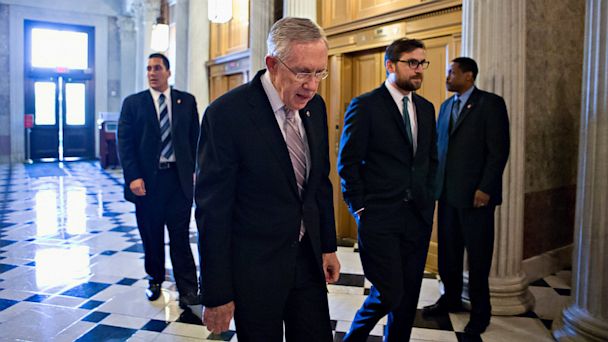Senate Delays Test Vote on Syria

J. Scott Applewhite/AP Photo
Senate Majority Leader Harry Reid hit the pause button Monday on the Senate debate over Syria by delaying the first test vote on the resolution authorizing the use of military force.
"I don't think we need to see how fast we can do this," Reid said on the Senate floor Monday. "I'm not going to file cloture this evening on the motion to proceed to the Syria resolution."
Earlier in the day, Reid indicated the first procedural vote would occur on Wednesday.
The delay comes one day before President Obama is set to court Senators on Capitol Hill when he speaks at the weekly Democratic and Republican lunches. The president is also set to take his argument to the public in an address to the nation Tuesday night.
But a growing chorus of senators came out Monday in opposition of the president's request to authorize a military strike against Syria. Six senators announced they would vote against the resolution authorizing the use of force in Syria, including Sen. Heidi Heitkamp, D-N.D., who became the sixth Democratic senator to oppose the president on the issue.
Three Democratic senators - Sens. Martin Heinrich, D-N.M., Barbara Mikulski, D-Md., and Bob Casey, D-Pa. - said Monday that they would support the president's request. But at least one senator who previously backed the use of force in Syria in the Senate Foreign Relations Committee said he remained concerned about the use of military force.
"I voted yes in the committee but I have concerns about action. Right now we need to deal with #Syria via diplomacy if possible," Sen. Ben Cardin, D-Md., tweeted Monday. A spokeswoman for Cardin said Cardin still supports the resolution.
As senators still weigh whether they will support the president's request, the White House is considering a proposal suggested by the Russian Foreign Minister to avert military strikes if Syrian President Bashar al-Assad agrees to hand over its chemical weapons stockpile to international control.
In an interview with ABC News' Diane Sawyer, President Obama said a military strike against Syria would "absolutely" be on pause if Assad turns over his chemical weapons.
"I consider this a modestly positive development," Obama told ABC News' Diane Sawyer in an interview at the White House when asked whether Syria's apparent willingness to relinquish control of its chemical weapons would prevent a U.S. strike.
"Let's see if we can come up with language that avoids a strike but accomplishes our key goals to make sure that these chemical weapons are not used," the president said.
The president said Secretary of State John Kerry would work on the proposal with Syria, and some lawmakers welcomed the idea.
"I have read the announcement by Russian Foreign Minister Sergey Lavrov that his country has asked Syria to transfer control of its chemical weapons to international monitors for destruction to prevent an international strike. I would welcome such a move," Sen. Dianne Feinstein, chairman of the Senate Intelligence Committee, said in a statement. "I believe that Russia can be most effective in encouraging the Syrian president to stop any use of chemical weapons and place all his chemical munitions, as well as storage facilities, under United Nations control until they can be destroyed."
Sens. John McCain, R-Ariz., and Lindsey Graham, R-S.C., who met directly with the president last week to discuss Syria, urged their colleagues to vote in favor of the Syria resolution, arguing that only the threat of military action would cause Assad to turn over his chemical weapons
"It should be clear to Members of Congress that only the threat of military action against the Assad regime's chemical weapons capabilities is what could create a possibility for Assad to give up control of those weapons," Graham and McCain said in a joint statement. "For this reason, Congress should proceed with its plans to consider and vote on the authorization for use of force that is now before the Senate, and today's development should make Members of Congress more willing to vote yes. This will give the President additional leverage to press Russia and Syria to make good on their proposal to take the weapons of mass destruction out of Assad's hands."